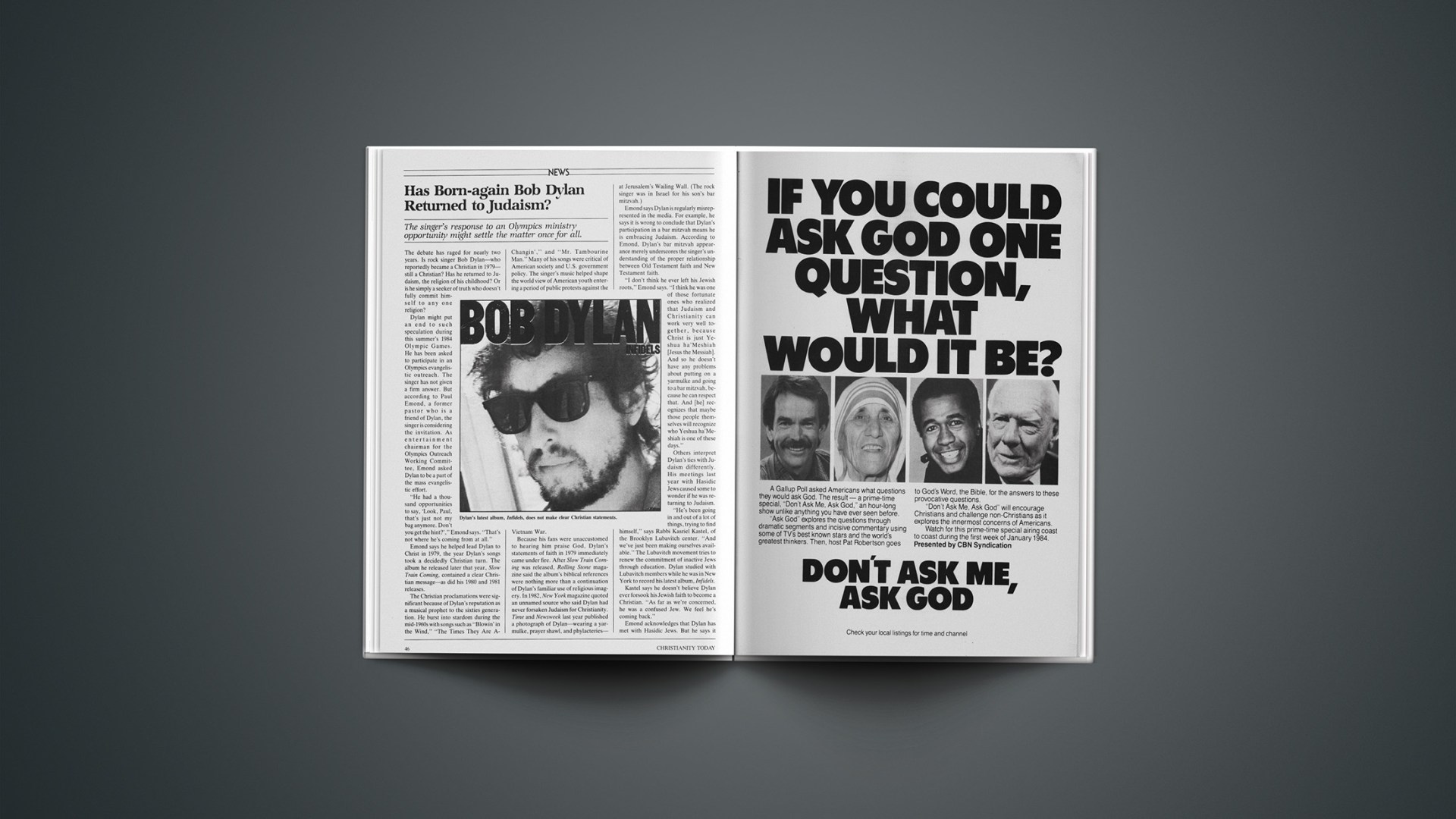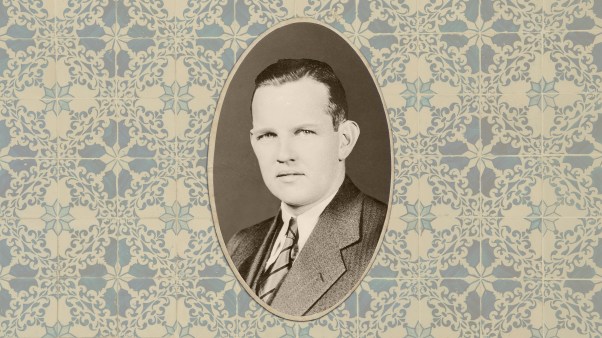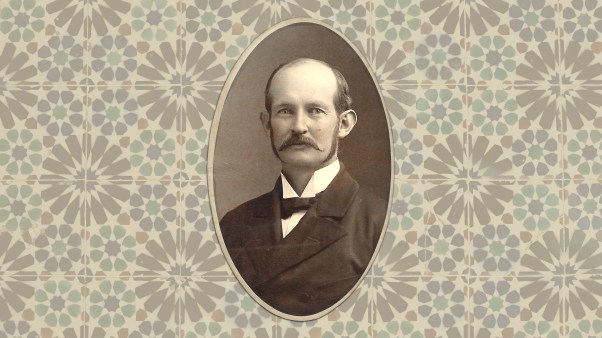The singer’s response to an Olympics ministry opportunity might settle the matter once for all.
The debate has raged for nearly two years. Is rock singer Bob Dylan—who reportedly became a Christian in 1979—still a Christian? Has he returned to Judaism, the religion of his childhood? Or is he simply a seeker of truth who doesn’t fully commit himself to any one religion?
Dylan might put an end to such speculation during this summer’s 1984 Olympic Games. He has been asked to participate in an Olympics evangelistic outreach. The singer has not given a firm answer. But according to Paul Emond, a former pastor who is a friend of Dylan, the singer is considering the invitation. As entertainment chairman for the Olympics Outreach Working Committee, Emond asked Dylan to be a part of the mass evangelistic effort.
“He had a thousand opportunities to say, ‘Look, Paul, that’s just not my bag anymore. Don’t you get the hint?’,” Emond says. “That’s not where he’s coming from at all.”
Emond says he helped lead Dylan to Christ in 1979, the year Dylan’s songs took a decidedly Christian turn. The album he released later that year, Slow Train Coming, contained a clear Christian message—as did his 1980 and 1981 releases.
The Christian proclamations were significant because of Dylan’s reputation as a musical prophet to the sixties generation. He burst into stardom during the mid-1960s with songs such as “Blowin’ in the Wind,” “The Times They Are A-Changin’,” and “Mr. Tambourine Man.” Many of his songs were critical of American society and U.S. government policy. The singer’s music helped shape the world view of American youth entering a period of public protests against the Vietnam War.
Because his fans were unaccustomed to hearing him praise God, Dylan’s statements of faith in 1979 immediately came under fire. After Slow Train Coming was released, Rolling Stone magazine said the album’s biblical references were nothing more than a continuation of Dylan’s familiar use of religious imagery. In 1982, New York magazine quoted an unnamed source who said Dylan had never forsaken Judaism for Christianity. Time and Newsweek last year published a photograph of Dylan—wearing a yarmulke, prayer shawl, and phylacteries—at Jerusalem’s Wailing Wall. (The rock singer was in Israel for his son’s bar mitzvah.)
Emond says Dylan is regularly misrepresented in the media. For example, he says it is wrong to conclude that Dylan’s participation in a bar mitzvah means he is embracing Judaism. According to Emond, Dylan’s bar mitzvah appearance merely underscores the singer’s understanding of the proper relationship between Old Testament faith and New Testament faith.
“I don’t think he ever left his Jewish roots,” Emond says. “I think he was one of those fortunate ones who realized that Judaism and Christianity can work very well together, because Christ is just Yeshua ha’Meshiah [Jesus the Messiah]. And so he doesn’t have any problems about putting on a yarmulke and going to a bar mitzvah, because he can respect that. And [he] recognizes that maybe those people themselves will recognize who Yeshua ha’Meshiah is one of these days.”
Others interpret Dylan’s ties with Judaism differently. His meetings last year with Hasidic Jews caused some to wonder if he was returning to Judaism.
“He’s been going in and out of a lot of things, trying to find himself,” says Rabbi Kasriel Kastel, of the Brooklyn Lubavitch center. “And we’ve just been making ourselves available.” The Lubavitch movement tries to renew the commitment of inactive Jews through education. Dylan studied with Lubavitch members while he was in New York to record his latest album, Infidels.
Kastel says he doesn’t believe Dylan ever forsook his Jewish faith to become a Christian. “As far as we’re concerned, he was a confused Jew. We feel he’s coming back.”
Emond acknowledges that Dylan has met with Hasidic Jews. But he says it wasn’t out of a desire to return to the Jewish faith. Emond says the meetings took place at the request of members of the Lubavitch movement.
“They can’t take the fact that he [Dylan] was able to come to the discovery of his Messiah as being Jesus,” Emond says. “Jews always look at their own people as traitors when they come to that kind of faith.… When one of their important figures is ‘led astray,’ they’re going to do everything they can to get him back again.”
But Kastel denies that his group is trying to take advantage of Dylan. “We don’t want anyone to feel that he’s being used in any way, which he’s very sensitive to. So we’re keeping this very, very low key.”
For his part, Dylan isn’t doing much to quell the debate. He does not grant many interviews, and CHRISTIANITY TODAY was unable to contact him. When he does grant interviews, his statements often are ambiguous.
The Los Angeles Times last year quoted him as saying he did not regret “telling people how to get their souls saved.” But he added, “Now it’s time for me to do something else.… Jesus himself only preached for three years.” The Washington Post quoted him as saying he believes in reincarnation.
In those articles as in others, Emond says, Dylan was misrepresented. “I know he doesn’t believe in it [reincarnation], so it must have been taken out of context or misinterpreted. They [writers] can take what he says, if they want, and make it sound pretty bad, depending on what questions they’re asking and how many words they leave out.”
Dylan has said he lets his songs speak for him. But his latest album doesn’t shed much light on his spiritual loyalties. The songs on the album make generous use of biblical imagery, but they make no clear declarations of faith. The absence of a Christian message leads some to wonder if the singer’s spiritual commitment has waned.
Such speculation leads Emond to criticize the church for passing judgment on Dylan. “If the Christians spent as much time praying for guys like Bob as they do talking or speculating on him, then we wouldn’t have these Christians like Bob that don’t come out as boldly as we might like them to.
“I’m not saying that he’s right in everything, because if I was in his position I would want to really capitalize on [his reputation as a vehicle for the gospel]. And maybe that’s in fact what he is doing, and he just has a different way of going about things.” If Dylan uses his musical talent to share the gospel during this summer’s Olympics, the speculation of the skeptics may be quieted.
North American Scene
A 14-year veteran of the Ku Klux Klan says the Klan plans to spark a major race war by assassinating a “prominent minority individual.” Tommy Rollins, a former grand wizard of the White Knights of America, told a “700 Club” audience last November that he fears for the life of presidential candidate Jesse Jackson. Since becoming a Christian last April, Rollins says the Klan has made three attempts on his life.
Roman Catholic bishops have made opposition to nuclear arms part of a new, national campaign against abortion. Chicago’s Joseph Cardinal Bernardin says he will spearhead an effort to fuse these issues in the public debate. His action officially removes abortion as a single issue for the bishops and places it at the heart of their advocacy of peace and social justice.
By a 59-to-38 vote, the U.S. Senate defeated a bill that would have made tuition tax credits available to parents of private-school pupils. In turning back the measure, the Senate overcame pressure from the White House and private-school organizations. The bill surfaced without warning as an amendment to an Olympics appropriations bill just before Congress adjourned for 1983.
A federal appeals court in Cincinnati has overturned the conviction of a 23-year-old Mennonite who refused to register for the draft. Convicted in October 1982, Mark Schmucker was fined $4,000 and sentenced to three years probation. In throwing out the conviction, the court ordered an evidentiary hearing to give Schmucker a chance to prove that he was selectively prosecuted. He contends that although hundreds of thousands of draft-age Americans have failed to register, only those who publicly opposed the law have been prosecuted.
Two out of three black pastors say they have not been influenced by liberation theologians such as James Cone, DeOtis Roberts, and Major Jones, according to a survey funded by the Lilly Endowment. Based on interviews with 1,894 black clergy, the study is the largest ever of black churches to be conducted by a nongovernmental group, says Lawrence Mamiya, the sociology of religion specialist who directed it. Only slightly more than half of the clergy surveyed feel their ministries are “essentially different” because they are in black denominations. Some 70 percent say it is important to use the terminology and concepts of black pride in their sermons.
The state of Utah cannot receive $500,000 in federal grants unless it stops requiring minors to notify parents when birth-control counseling is sought. The ruling was handed down by Federal District Court Judge David Winder. It arose from a suit filed by Planned Parenthood of Utah and the Park City Clinic on behalf of four teenagers who objected to the procedures.
The U.S. Supreme Court will not review a lower court ruling that forbids a moment of silence in New Mexico’s public schools. The state’s legislature passed a law in 1981 that called for a time of silence at the beginning of each school day. But last February, a federal district judge ruled that the law violated the First Amendment’s establishment clause.
A military judge has convicted the former commanding officer of a U.S. Navy frigate of engaging in homosexual acts with a member of his crew. Michael Vanderwier is believed to be the first commanding officer in the U.S. military ever to face such charges, although 12 officers and 1,115 enlisted personnel have been dismissed from the navy in the last year because of homosexuality. The 42-year-old Vanderwier denied the charges. The crew member involved in the homosexual acts, John Rainville, was granted immunity from prosecution in exchange for his testimony.
Seminary enrollment in 1983 increased nearly 5 percent over the previous year, the Association of Theological Schools (ATS) announced. For the last several years, the growth rate of seminary enrollment has exceeded that of colleges, universities, and other professional schools. ATS reported that women and minority students are largely responsible for the increase.
One Last Note on The Day After
Did you catch that tune? Many who watched ABC’s movie The Day After did. An attempt at depicting the horrors of nuclear war, the television drama opened and closed to the strains of an old church favorite—“How Firm A Foundation.” When film director Nicholas Meyers discovered that Virgil Thomson’s musical score “The River” described Kansas—where the story in The Day After took place—he decided to use the music. But Meyers insists he didn’t know that the melody he used at the beginning and at the end of the film was the music of a hymn, with words significant to the story.
When through fiery trials thy pathway shall lie,
My grace, all sufficient, shall be thy supply;
The flame shall not hurt thee; I only design
Thy dross to consume, and thy gold to refine.
The film began with a sweeping view of Kansas farmland, as the music to “How Firm a Foundation” invited the viewer to sit back and watch. When the drama ended, the screen went black and a voice echoed: “Is anybody there? Anybody at all?” But as the voice died out, the music was heard again, this time resounding with strength. For those familiar with the words of the hymn, there was still hope, if not in man then in God.










